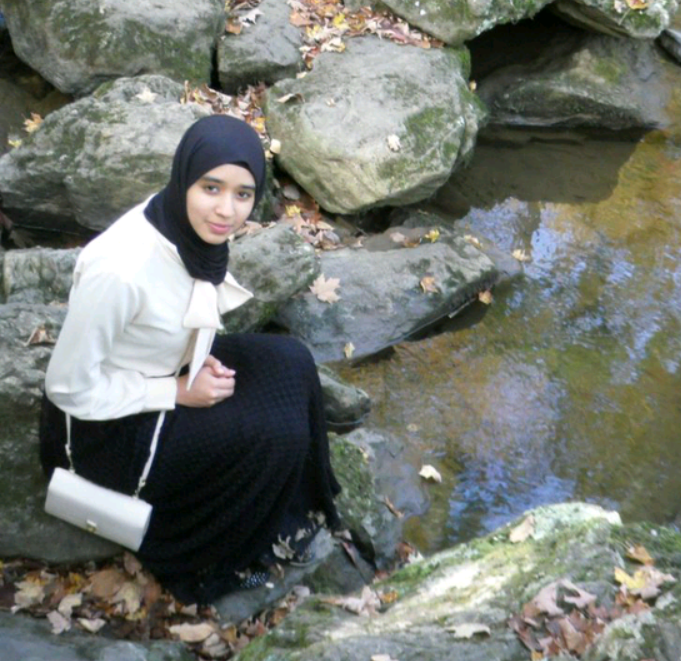
“The king of Saudi Arabia died last night.” What kind of everyday life do we live when these are the first words our sixteen-year-old says to us when she comes down for breakfast?
“How did he die?” I ask, and “Who will succeed him?” Michael wonders. What does this mean for Saudi Arabia? Will the peace change, or didn’t they have peace before?
Zahraa’s eyes are big with curiosity about the unknown. There is much she doesn’t know, she makes that clear, but this is an important event in her life–we can also see that.
“If I was at home, I wouldn’t be happy,” Zahraa says. “Because in the Gulf Countries, if someone dear to someone dies, they have off school for three days. But in Bahrain, we never do. They just put the flag low and have school.” From what she has said before, Bahrain puts a premium on education.
Zahraa is wearing a jacket with gray and black horizontal bars this morning, topped by a black hijab, her yellow-green shirt in eye-catching contrast. She’s talking about the king of Saudi Arabia and she’s sitting at our breakfast table eating Marshmallow Mateys–courtesy of Malt O’ Meal and the discount food warehouse–with warmed milk. Today at school she starts taking Sculpture instead of 3-d design, and yesterday she switched from Algebra 2 to Pre-Calc. Does she belong to us?
Forever, she’ll belong in our hearts. For now, she belongs in our family and in the letters I write to my friends, in which I record stories such as the following:
One day in October Zahraa came home from school, and we shared a rather typical after-school conversation. (She comes home a full half-hour before our own girls do.) Her conversations contain almost impeccable English, but she throws the accent on unusual places. I haven’t decided why. Because she is Bahrainian? Or sixteen? Or Zahraa?
She said, “I hated myself today. Here, let me show you why, let me show you my legs,” and she came and leaned against the cupboard and lifted her foot. Various colors of paint decorated her pink and white footsie. It had happened in painting class.
“See this? So then I thought I would take off my socks, and I took off my socks” –she takes them off as she speaks–“and see, then I got them on my feet! And the paint”–she pronounces this word baint— “was at the other side of the room and we had to walk the whole way across the room to get the paint and it was so far…
“And then we had to paint–” she stooped over, making long sweeping motions on the ground.
“How is this going to help you in life?” I asked her.
“That is the thing! It is meaningless! I hate this kind of painting.
“Then I walked across the painting (bainding) and I accidentally stepped on the painting, and then I walked across the floor, and my feetsteps are everywhere!
“Boys, do you want to see this?” And she held up her foot to Joshua and Isaiah, and they exclaimed, and she said, “don’t ever paint. You don’t want to ever paint.”
And off she stormed upstairs, carrying her rainbow-colored footsies.
In November, one day when Zahraa had off school, we went to my sister Sharon’s house, and made cookies. Zahraa was taking cookies from the pan and paused. “I think these need to relax a little more first,” she said.
I laughed out loud. She asked what I would say. I said that maybe I would say they need to rest. Or–set up.
She shook her head, laughing also. “Yeah, where’d I bring that from?” she asked.
I wonder too. From Bahrain, I guess.
“Where is Bahrain?” Isaiah asked the other day, after all these months.
“Bahrain is in Zahraa’s heart” Joshua answered, recalling to mind the day he told his sisters, when they were discussing where they came from, that he “came from Mommy’s heart.”
That comment, though one significant enough for me to record in my letters, is one any four-year-old child in America might say, for his mother to treasure.
What about this one, which we heard from the boys’ bed after we had retired one evening? It was Joshua: “Isaiah opened the light, and now I can’t sleep.”
“Did he say ‘opened the light’?” I asked Michael.
“Yeah, I think so.” He didn’t seem surprised. Why was I? Zahraa never turns on the light. She always opens it. When she’s home alone in the evenings, she “opens all the lights” so she’s not scared.
My sons have no way of knowing this is not an American English term.
By the time they are sixteen, they most likely will have but dim memories of the years we hosted exchange students. But I have written it down, these comments and more. I won’t forget the day my sixteen-year-old daughter asked, “Mom, how do you sneeze a sneeze that refuse going out?”
What way would I say it? After she has spoken, I search my mind for an alternative wording and come up blank.
But then there are entire conversations–such as how many wives has the king of Bahrain, what is the quality of life in Dubai, and whether or not Muhammad’s wife Aisha was a good wife–that I would never have even tried to think of words for.
This is the blend we are privileged to experience this school year. We try to treasure it; we like to share it. But often, we forget.
This past Friday evening we roasted hot dogs at our family room fire place. We hadn’t done that since Zahraa came. When she saw the fine hot dog roasting sticks which Michael made a few years ago, she gasped. “Are those real? I thought those were only in the movies!”
She couldn’t have hot dogs with the rest of us–we haven’t found halal hotdogs yet–but she roasted a slice of her canned beef. And when someone suggested s’mores for “dessert,” we learned that she had never heard of s’mores before.
Of course we couldn’t have this. I was planning to go to the Dollar General store later that evening, and I asked Michael if I could pick up the ingredients for s’mores. Sure.
Standing in line at the checkout counter half an hour later, I struck up a conversation with the lady in line behind me. I told her–because I talk about it obsessively to everyone–about our Sunni Muslim exchange student from Azerbaijan last year, our Shia Muslim student from Bahrain this year…
She stared at me, from my black bonnet to my dowdy everyday dress. I couldn’t have looked anything other than I was: a common, pregnant Mennonite housewife with a plain face, buying baking powder and S’mores ingredients. And she just shook her head. “I have goose bumps,” she said.
So subtly the exotic becomes the familiar, that I don’t get goose bumps about it any more. But I do, occasionally, think about it. It is fascinating to watch a sixteen-year-old roast marshmallows for the first time in her life. Most of my children will never remember the first time they ate s’mores. This girl takes a picture of the first one she makes, before she takes a bite. She shares it with sixty friends across America and the world, and within moments a Bahrainian boy living in Washington state comments on it. She hands the phone to me so I can read the comment: “Enjooooooyyy!!!!” And then a string of unfamiliar words, a sort of texting-appropriate cross between English and Arabic.
No, this is not usual Pennsylvania Mennonite home life. I think about that sometimes.
I realize how strange it is that today, Friday morning, in among combing Rachael’s hair, making sure Laurel has a belt for her dress, helping Allegra get a drink of water, settling whether or not Isaiah had the ball first, and opening the chalk box for Joshua, I keep thinking about the future of Saudi Arabia, and praying for people I never saw in a region of the world I may never visit.
The king of Saudi Arabia died last night. He was an old king. He’s had health problems–they “changed his blood a couple times already”–and he will likely be succeeded by one of his brothers.
Who would have dreamed that I would care?
***
You can order more of Sheila’s international tales, which she sells looseleaf, by contacting her at her email address: sjpetre@emypeople.net. You can also order a personally autographed copy of From Joy…to Joy, a compilation of poems chronicling her journey through grief.
Read another of her stories, “Antics at an International Potluck,” here.

I enjoyed this, thank you for sharing this!
Pingback: Oh, the Places You'll Go - Lucinda J Kinsinger